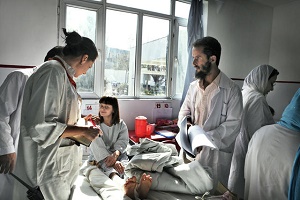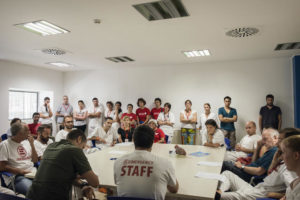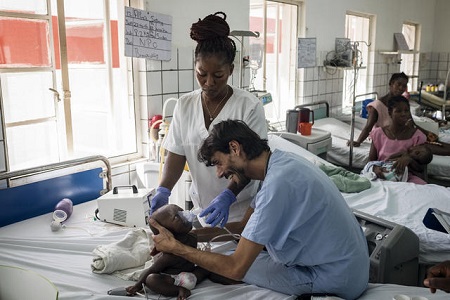Important facts
This role requires complete and autonomous management of critical patients in emergency situations and the provision of anaesthetic care perioperatively and in Intensive Care.
Background and organisation of work
The international Anaesthetist is responsible for the clinical management of the Intensive Care Unit.
He/She will work as part of a team of international specialists – experts or in training – organising and carrying out the training of the local medical and health care staff in his/her area of responsibility, in collaboration with the international surgeons and the Medical Coordinator of the project. On occasion, a resident physician will be present to support clinical activity or research. The international Anaesthetist is responsible to the Medical Coordinator, who is in charge of the management and organisation of the project.
The main areas of work are:
- OPERATING THEATRES: 2-3 operating theatres for General Surgery (emergency and elective) and Orthopaedic Trauma Surgery based on the admissions criteria of the Centre;
- INTENSIVE CARE AND HIGH DEPENDENCY UNIT: 6-8 beds equipped according to the protocols in use and the resources available.
The international Anaesthetist is on-call 24/7, with days off decided according to clinical requirements. He/she will be involved in the care of all critical patients in the Emergency Department, hospital emergencies, and any patients requiring anaesthetic assistance during diagnostic or therapeutic clinical procedures (e.g. CT scan, E-FAST…). In carrying out these activities, the specialist works alongside and supervises the national anaesthetic technicians and personally manages the most complex cases.
Duties and Reponsiblities
All EMERGENCY international personnel is expected to know and follow the hospital admissions criteria, guidelines, protocols, and the diagnosis and treatment standards in use in the Centre, and to ensure the correct compilation of clinical records and statistics in both computer and paper formats.
The main duties and responsibilities of the international Anaesthetist are:
- management of anaesthetic procedures in the pre-operative, intra-operative and post-operative phases, and in cases where anaesthetic assistance is required for diagnostic procedures;
- management of surgical and medical patients in Intensive Care;
- management of hospital emergencies (Emergency Department, Intensive Care, ward);
- safety checks and supervision of the maintenance of the ventilators (where present), monitors, infusion pumps and any other technological equipment used in anaesthesia;
- assistance in clinical research and record keeping as required by the scientific programmes of the specialist sector of the Medical Division of EMERGENCY.
Clinical activity and decisions regarding patient treatment must always be discussed and shared with the Medical Coordinator, national and international medical and surgical colleagues, and the national and international nursing personnel.
Management and training of local personnel
Clinical activities and patient care are always carried out alongside and in collaboration with local personnel, who thus benefit from training in the field. There is also provision for more specific teaching activities, managed by the international specialists, in accordance with the clinical protocols in use and as agreed with the Medical Coordinator.
Caseload and equipment
The technological level of the equipment present in the Centres is suited to the clinical and managerial protocols in use, and the level of professional autonomy of the national staff, with the aim of achieving – and sustaining – high standards of care. Diagnostic equipment, basic laboratory tests, technical and auxiliary services are always available.
COMPLEXE PÉDIATRIQUE – Central African Republic, Bangui
Upon the request of the Hospital Direction, in April 2013 EMERGENCY sent a team specialized in war surgery to the Complexe Pédiatrique de Bangui, the children’s hospital of the capital and national paediatric referral centre, with the aim of providing life-saving surgeries to the war wounded children.
Whit the improvement of the security conditions in the Country, in addition of war surgery, EMERGENCY expanded its activieties to the emergency surgery, including general surgery, traumatology, orthopaedic and reconstructive surgery.
SURGICAL CENTRE – Anabah, Afghanistan
The Anabah hospital was the first centre opened by EMERGENCY in Afghanistan. When we first arrived in the Panjshir Valley in 1999, we converted a former barracks into a Surgical Centre to provide free care for victims of war and landmines that had been strewn across the area during the Russian offensive. These landmines were still creating victims 20 years on, without a single medical facility in the entire valley to provide treatment. The hospital has now broadened its range of activities. As well as war surgery, it now also handles emergency surgery, general surgery, traumatology, internal medicine and paediatrics. What began as a Surgical Centre for war victims has now become a general hospital, providing free care to an average of 127 people per day.
SURGICAL CENTRE – Kabul, Afghanistan
The Surgical Centre in Kabul is today the most important centre for war surgery in the Country. The Intensive Care Unit has 7 beds with monitoring systems and ventilators. CT scanning equipment is available.
Both paediatric and adult patients are treated. Around 20% of patients are under 14 years of age and present with bullet injuries, shrapnel, landmine injuries, stab wounds and burns. Abdominal, vascular, orthopaedic trauma, plastic, thoracic, maxillofacial, ocular and neurosurgical interventions are carried out both electively and in emergency.
SURGICAL CENTRE – Lashkar-gah, Afghanistan
This is the only specialist war surgery centre in the region. The Intensive Care Unit has 6 beds with monitoring equipment. The admissions criteria and therefore the caseload are similar to those in Kabul, but with a higher prevalence of paediatric patients.
SURGICAL AND PAEDIATRIC CENTRE – Goderich, Sierra Leone
Every day over 130 patients are treated at the Surgical and Paediatric Centre in Goderich. Over time the admissions criteria have been broadened in response to the needs of the population: today they include Traumatology, Emergency and Elective surgery (emergencies permitting). In 2012 an 8-bed Intensive Care Unit, guest quarters for relatives accompanying patients living far away from the Centre, and two new operating theatres were opened.
Many patients are paediatric medical patients, and often need resuscitation due to cerebral malaria, shock resulting from severe anaemia, serious respiratory infections, tetanus… It is the only facility in the Country offering endoscopic treatment for oesophageal lesions caused by the accidental ingestion of caustic soda by children, who are often very young and already suffering from malnutrition.
 Guidelines, Protocols and Equipment
Guidelines, Protocols and Equipment
Further information on the guidelines, protocols and clinical services relevant to the post along with details of the instruments and equipment available will be provided at interview and during the period of preparation for the mission.
Specific requirements
- Medical Degree, and current professional registration on the medical register of your Country of residence;
- specialisation in Anaesthesia and Intensive Care with at least 5 years’ relevant professional experience;
- experience in managing general and local anaesthetic techniques in both adult and paediatric patients;
- experience in general, orthopaedic trauma and paediatric surgical centres;
- experience in managing emergency situations.
Required availabilty
6 months overseas stay including a period of leave to be taken at the end of the mission in agreement with the coordinator. Shorter missions may only be considered for specific needs as defined by the organisation.
Are you interested?
If you are interested please write an e-mail to fo.recruiting@emergency.it.

